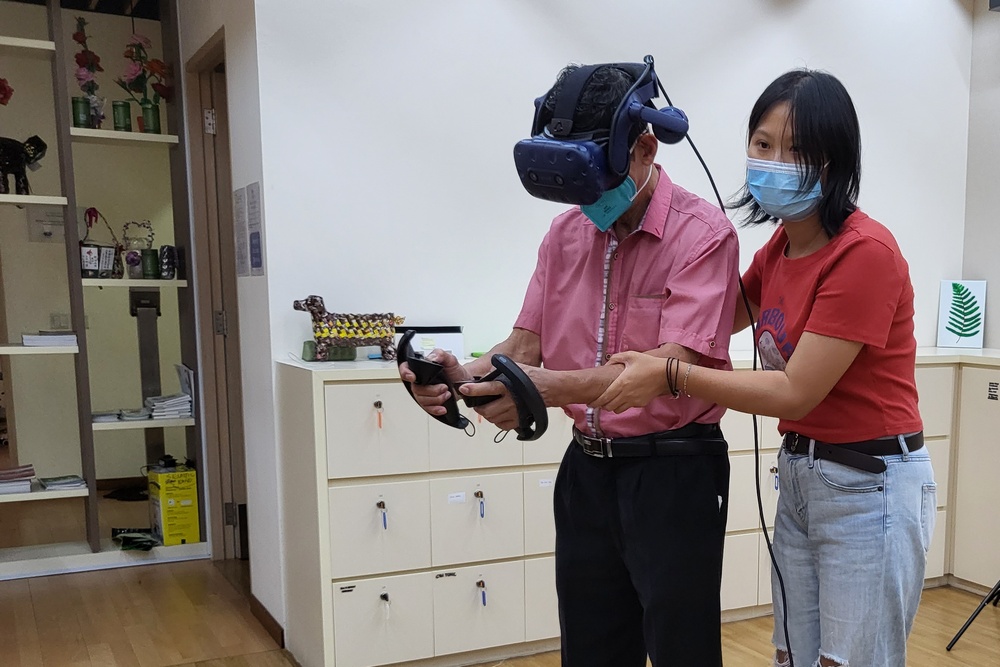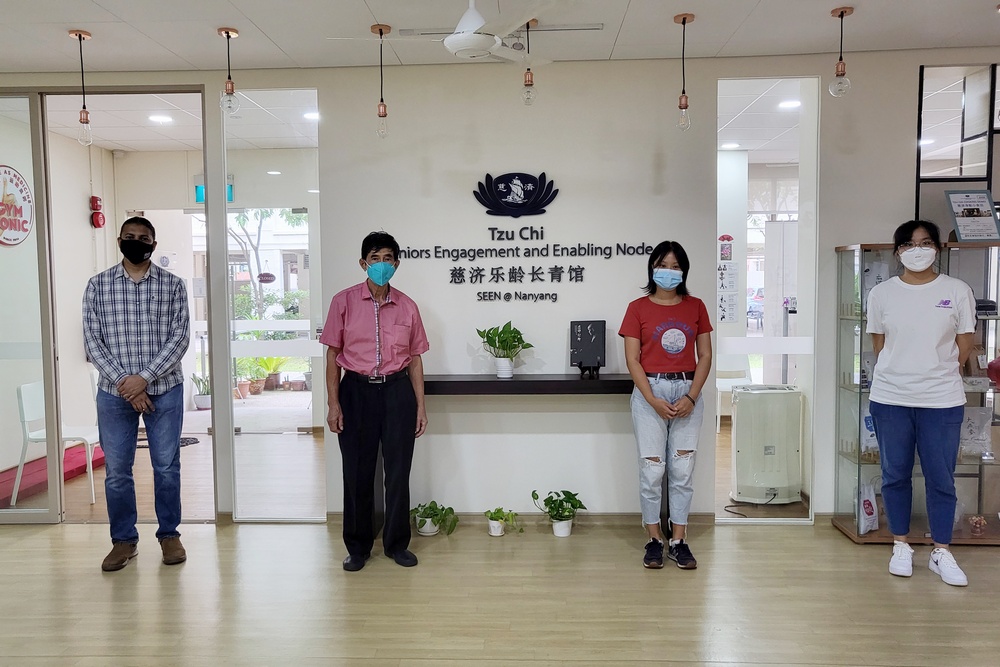Disclaimer: All activities depicted in this article were conducted in compliance with the COVID-19 rules and regulations at that given time.
A senior engaging in the VITAL Health Box research activity at SEEN. (Photo by Tan Sam Ba)
Technology and seniors - these are two words that are not commonly associated together. But at Tzu Chi Seniors Engagement and Enabling Node (SEEN) centres, some seniors have had the chance to try out new technology as part of several research projects by Nanyang Technological University, Singapore (NTU). Since 2019, there have been quite a few collaborations between SEEN and NTU on various projects, including technology-related prototype testing, surveys, as well as focus group interviews.
One particularly significant project has been the Virtual Integrated Therapy for Active Living (VITAL) Health Box: A Monitoring and Motivating Companion to Reduce Frailty for Older Adults. Through the use of motion-based technology, seniors have been able to exercise by engaging in gameplay on the VITAL Health Box prototype under the guidance of NTU researchers at various senior activity centres. Over a period of eight weeks, some 170 seniors across 14 senior activity centres would play the games on the VITAL Health Box for three times a week as part of the research study. Out of these seniors who took part, about 30 of them were from SEEN.
According to NTU Wee Kim Wee School of Communication and Information (WKWSCI) research assistant, Mr Chia Bing Xun, the preliminary findings showed that seniors who took part in the study were significantly more engaged as compared to other seniors. Additionally, among those seniors who were classified as pre-frail, a high proportion of them showed signs of improvement.
Mr Chia also explained how working with SEEN for this project was beneficial for both parties due to the common goals shared.
“When we started recruiting for this project, Tzu Chi had just opened their two centres at Nanyang and Bukit Batok. Both of us were looking at promoting meaningful activities for the seniors, so it was a very natural partnership,” he said.
“SEEN has been very helpful in providing the venue and also in recruiting and encouraging the seniors to come forward to participate. The seniors here have also been very vibrant and cooperative, with the mentality of wanting to learn something.”
Judging from the faces of intense concentration as the seniors were partaking in games such as boxing on the VITAL Health Box, it was evident that they enjoyed the activity as well as the workout that came along with it.
“I like to play the games because I’m able to exercise at the same time. It also helps to work my brain as there are many things going on at the same time,” shared Mr Tan Kim Chye, a 70-year-old senior who is a recovered stroke patient. “I’m not really nervous about the new technology as it can be slowly picked up. If there are other similar activities in future, I wouldn’t mind trying again.”
The reception towards new technology among seniors has generally been a positive one and this has further reinforced Mr Chia’s belief that technology and seniors can co-exist as long as there is some form of guidance and encouragement.
“In every senior, there is a child in them who wants to play. For most of them, once they get the hang of it, they are actually very accepting of the technology. It is just a matter of whether resources and avenues are made available for them,” he commented.

NTU WKWSCI research assistant, Mr Chia Bing Xun (right), guiding Mr Tan (left) through the VITAL Health Box activity. (Photo by Chong Yu Jia)
Another senior trying out the boxing game on the VITAL Health Box under the watchful eyes of Mr Chia (left). (Photo by Tan Sam Ba)
Experiencing Virtual Reality
Besides the VITAL Health Box project, another noteworthy NTU research project which got the seniors excited would be the testing of a Virtual Reality (VR) training system. The project, Virtual and Augmented Reality Training Systems for the Elderly in Singapore, aims to address the challenges of an ageing society by aiding seniors towards having the confidence to live independently and with dignity. Rather than relying on conventional training and teaching methods, the researchers wanted to examine if the VR system would be a suitable and cost-effective learning tool for seniors. Thus, seniors at the SEEN centres were able to have a first-hand experience of this VR technology and subsequently provide their feedback.
Through the VR training system, the seniors were exposed to several scenarios such as learning how to withdraw cash from the ATM, how to use the self-checkout kiosk in the supermarket, and determining whether a certain exercise posture was correct. While the area of VR might still be relatively new to most seniors, the new training system proved to be as well-received as the VITAL Health Box.
“In terms of motivation and satisfaction, at least for the Tzu Chi seniors, we have not had complains about difficulties in using the VR system,” shared Dr Ariffin Kawaja, who is an NTU WKWSCI research fellow involved with the project. “While some studies indicate that seniors might find it difficult or dizzy, we were pleasantly surprised by the seniors from Tzu Chi as there was great acceptance from their side.”

An NTU researcher guiding a senior through the VR training system. (Photo by Wong Yen Hoon)
 A screen showing what participants saw during the process of learning how to do ATM cash withdrawal on the VR system. (Photo by Wong Yen Hoon)
A screen showing what participants saw during the process of learning how to do ATM cash withdrawal on the VR system. (Photo by Wong Yen Hoon)
60-year-old Ms Ng Siew Geok was one of the seniors who tried the VR system for the first time and she found herself relishing the opportunity to experience something new.
“I was very curious so I signed up for the study as I wanted to know what it was all about. Our society is constantly improving and we have new things every day. So if there is an opportunity, we should try to learn more,” she said.
With the testing of the VR system spanning more than a year starting from 2021, involving around 70 seniors from SEEN, the help from the centres has been undoubtedly crucial. And this support was duly acknowledged by the NTU research team.
“SEEN has been extremely helpful in supporting the project from the management down to the staff who are involved in the day-to-day operations,” said Dr Ariffin. “A lot of professors who I have worked with are quite familiar with Tzu Chi, so it is one of the first names to be mentioned whenever there are new research areas. Tzu Chi has also been very forthcoming in taking part in the projects and it has been good working together.”

Ms Ng Ng Siew Geok (left) filling up a survey form upon completion of the VR activity. (Photo by Wong Yen Hoon)
 NTU researchers in charge of the VR training system activity, including WKWSCI research fellow Dr Ariffin Kawaja (left), regularly visit SEEN to conduct their research. (Photo by Wong Yen Hoon)
NTU researchers in charge of the VR training system activity, including WKWSCI research fellow Dr Ariffin Kawaja (left), regularly visit SEEN to conduct their research. (Photo by Wong Yen Hoon)
Crucial Support Pillars of Research
Beyond the two technology-driven studies, other key projects which SEEN has supported since 2019 have been a focus group discussion to understand the problem of fake news among seniors in Singapore and a survey to find out about the seniors’ job-seeking intentions, technology use and general well-being. There has also been a motor and cognitive training experiment with the H-MAN robot, where the effects of training with a robotic manipulator is tested on healthy adults.
Judging by the myriad of research projects which SEEN has been involved in, it is a testament to the importance of the centres in the research sphere. According to SEEN staff Ms Agnes Chua and Ms Karen Loi, having the same goal of supporting our seniors and similar activities which incorporated exercise, as well as the vicinity of the centre to NTU were key reasons behind the partnership.
For the technology-related projects, while there was initially some apprehension among the seniors about taking part, most of them soon found themselves enjoying the activities.
Ms Chua shared: “Some seniors were a little reluctant initially so we had to encourage them that there is no need to worry as there would be researchers providing guidance. After agreeing to join, you can see that they had great fun participating in the projects, with some even commenting that time passed too fast.
“Overall, the response has been positive and it is a good learning opportunity for our seniors as they are able to have new experiences.”
Ms Loi agreed: “Singapore is currently moving towards the use of high technology in our society. This will help them to have an idea and subsequently apply in real life.”
With active ageing being widely encouraged today, the numerous collaborations between SEEN and NTU have certainly played a key role in helping the seniors in various aspects through their golden years. By working closely with the researchers, the centres have facilitated opportunities for new areas of knowledge to be potentially uncovered. Seniors themselves have also benefited directly through engaging in these refreshing and educational activities. Thus, SEEN will hope to continue supporting in the same fashion for many more suitable research projects in the near future.



